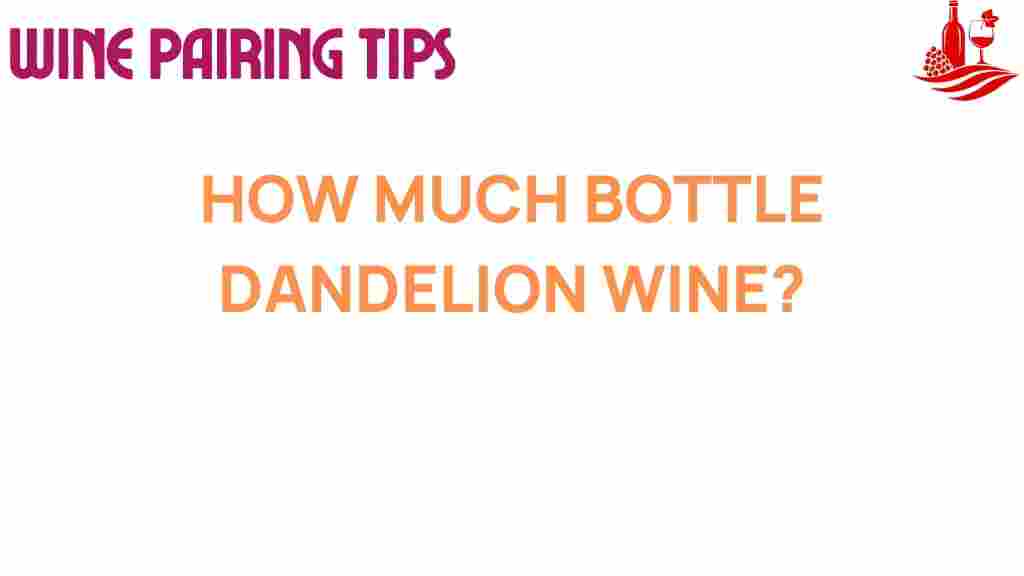The Hidden Cost of Dandelion Wine: What You Need to Know
Dandelion wine, a beloved traditional beverage, brings a taste of nostalgia and nature’s bounty into our homes. As many enthusiasts explore the art of crafting homemade wine, an important consideration emerges: the hidden costs associated with making dandelion wine. In this article, we will delve into the intricacies of pricing, cost analysis, and the various factors that influence the final expenses of producing this artisanal beverage.
Understanding Dandelion Wine
Dandelion wine is made from the bright yellow blossoms of the dandelion plant, which bloom in late spring. Not only is it a delightful drink, but it also connects us to the seasonal ingredients available in our local environments. The wine is typically sweet and floral, with a unique flavor profile that reflects the terroir of the dandelions used.
Factors Influencing the Cost of Dandelion Wine
When considering the pricing of homemade dandelion wine, several factors come into play:
- Ingredients: The primary ingredient, dandelion flowers, is often free if foraged from your own garden or local parks. However, if you buy them from local markets, costs can add up.
- Additional Ingredients: Sugar, yeast, and any flavor enhancers (like citrus or spices) will also contribute to the overall cost.
- Equipment: The initial investment in winemaking equipment—fermentation vessels, bottles, and corks—can be significant.
- Time: The process of making dandelion wine is time-consuming, and time is often an overlooked cost.
Cost Analysis of Homemade Dandelion Wine
Let’s break down the cost analysis of homemade dandelion wine, focusing on the key components:
1. Ingredients
Gathering dandelions is the first step. If you choose to forage:
- Foraged Dandelions: Free or negligible cost.
- Purchased Dandelions: Prices can range from $5 to $15 per pound in local markets.
Next, consider additional ingredients:
- Sugar: Approximately $2 for 5 pounds.
- Yeast: A packet costs about $1.
- Citrus fruits (if used): Around $3 for a few lemons or oranges.
Overall, ingredient costs can range from $10 to $25 for a batch of dandelion wine, depending on whether you forage or purchase.
2. Equipment Costs
Investing in equipment is essential for making high-quality dandelion wine. Here’s a breakdown:
- Fermentation Vessel: $20 – $50.
- Bottles and Corks: $15 – $30 for a dozen bottles.
- Siphoning Equipment: $10 – $25.
In total, equipment costs can range from $45 to $105, but these are one-time expenses that can be used for future batches.
3. Time Investment
Making dandelion wine is a labor of love. The entire process can take several weeks, from gathering dandelions to fermentation and aging. Consider the following:
- Foraging and preparing dandelions: 2-3 hours.
- Fermentation period: 4-6 weeks.
- Bottling and aging: 3-6 months.
While the time investment is substantial, it is crucial for the development of flavor in your wine.
Where to Find Dandelion Wine Ingredients
Local markets and vintage finds can play a significant role in sourcing quality ingredients for your dandelion wine. Here’s how to effectively explore:
- Local Farmers’ Markets: Often have fresh, organic dandelions and other ingredients.
- Herbal Shops: May sell dried dandelion flowers if foraging isn’t an option.
- Online Suppliers: Websites dedicated to home brewing can provide high-quality yeast and other essentials.
- Vintage Finds: Check thrift shops for old winemaking equipment that can be refurbished.
Seasonal Considerations
Dandelion wine is inherently seasonal, as it relies on the blooming of dandelions in spring. This seasonality impacts availability and pricing:
- Spring Harvest: Optimal time for gathering dandelions, often resulting in lower costs.
- Out-of-Season Availability: Dandelions may be harder to find in local markets, leading to increased prices.
Common Troubleshooting Tips
As you embark on your dandelion winemaking journey, you may encounter some challenges. Here are common issues and solutions:
- Fermentation Problems: If fermentation stalls, check the temperature and ensure yeast activity by providing warm, consistent temperatures.
- Bitter Taste: Excessive green parts of the dandelion can lead to bitterness. Make sure to use only the blooms and a few leaves.
- Cloudy Wine: If your wine is cloudy, consider using fining agents to clarify it.
Conclusion
Making dandelion wine is a rewarding experience that connects you to seasonal ingredients and local markets. However, understanding the hidden costs of this artisanal beverage is crucial for anyone considering this endeavor. From ingredient pricing to equipment investment and time commitment, each element plays a role in the overall cost analysis of homemade wine. By being aware of these factors, you can ensure that your winemaking journey is both economical and enjoyable.
For more detailed guides on winemaking, visit this resource. Happy winemaking!
If you’re interested in exploring more about artisanal beverages, check out this article for innovative ideas and recipes.
This article is in the category Tasting and created by Wine Pairing Tips Team
